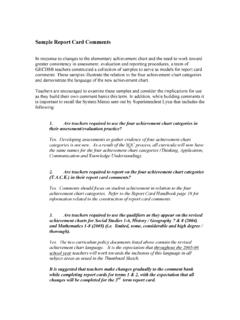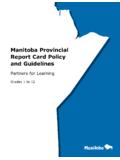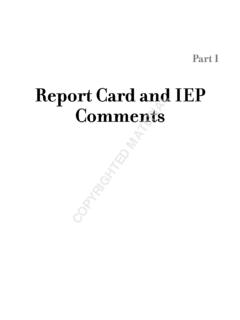Transcription of Understanding the PYP Report Card-Term2
1 Understanding the IB PYP Report card The IB Primary Years Program Tarbiyah Academy Created: December 2015 2 Table of Contents THE INTERNATIONAL BACCALAUREATE S MISSION STATEMENT 3 THE IB LEARNER PROFILE 3 I. Understanding THE PYP Report card 4 A. LEARNER PROFILE 4 B. PYP ATTITUDES 4 C. TRANS-DISCIPLINARY SKILLS 4 D. UNIT OF INQUIRY 4 E. CONTENT STANDARDS 4 F. SUBJECT SPECIFIC 4 G. HOMEROOM ADVISOR comments 4 II. ACHIEVEMENT CRITERIA 5 III. EFFORT CRITERIA 6 3 The International Baccalaureate s Mission Statement The International Baccalaureate aims to develop inquiring, knowledgeable and caring young people who help to create a better and more peaceful world through intercultural Understanding and respect. To this end, the organization works with schools, governments and international organizations to develop challenging programmes of international education and rigorous assessment.
2 These programmes encourage students across the world to become active, compassionate and lifelong learners who understand that other people, with their differences, can also be right. The IB Learner Profile1 Inquirers We develop their natural curiosity. We acquire the skills necessary to conduct inquiry and research and show independence in learning. We actively enjoy learning and this love of learning will be sustained throughout their lives. Knowledgeable We explore concepts, ideas and issues that have local and global significance. In so doing, We acquire in-depth knowledge and develop Understanding across a broad and balanced range of disciplines. Thinkers We exercise initiative in applying thinking skills critically and creatively to recognize and approach complex problems, and make reasoned, ethical decisions. Communicators We understand and express ideas and information confidently and creatively in more than one language and in a variety of modes of communication.
3 We work effectively and willingly in collaboration with others. Principled We act with integrity and honesty, with a strong sense of fairness, justice and respect for the dignity of the individual, groups and communities. We take responsibility for our own actions and the consequences that accompany them. Open-minded We understand and appreciate their own cultures and personal histories, and are open to the perspectives, values and traditions of other individuals and communities. We are accustomed to seeking and evaluating a range of points of view, and are willing to grow from the experience. Caring We show empathy, compassion and respect towards the needs and feelings of others. We have a personal commitment to service, and act to make a positive difference to the lives of others and to the environment. Risk-takers We approach unfamiliar situations and uncertainty with courage and forethought, and have the independence of spirit to explore new roles, ideas and strategies.
4 We are brave and articulate in defending their beliefs. Balanced We understand the importance of intellectual, physical and emotional balance to achieve personal well-being for themselves and others. Reflective We give thoughtful consideration to our own learning and experience. We are able to assess and understand their strengths and limitations in order to support their learning and personal development. 1 International Baccalaureate Organization 2006 4 I. Understanding the PYP Report card Each student s Report card consists of several sections. Each section reports on student progress over the past term. Each term consists of two Units of Inquiry. A. Learner Profile This part of the Report card lists the specific IB Learner Profile traits (inquirer, knowledgeable, thinker, communicator, principled, open-minded, caring, risk-taker, balanced, reflective) that were connected to the units of inquiry taught during the term.
5 A general comment written by all the student s Homeroom Teacher is included in this section. B. PYP Attitudes This part of the Report card lists the specific PYP Attitudes (appreciation, empathy, commitment, enthusiasm, confidence, independence, cooperation, integrity, creativity, respect, curiosity, tolerance) that were connected to the units of inquiry taught during the term. A general comment written by the Homeroom Teacher is included in this section. C. Trans-disciplinary Skills This part of the Report card lists the specific trans-disciplinary skills (thinking skills, social skills, communication skills, self-management skills, research skills) that were connected to the units of inquiry taught during the term. An achievement and effort grade as well as a general comment written by the Homeroom Teacher is included in this section. D. Unit of Inquiry (UOI) This section lists two units of inquiry the class experienced through the term.
6 Within each unit of inquiry, the trans-disciplinary theme (Who we are; How we express ourselves; How we organize ourselves; Where we are in place and time; How the world works; Sharing the planet), the central idea and lines of inquiry, are highlighted. Effort, achievement marks and comments are recorded for each unit. E. Content Standards Under each UOI, the content standards that were taught are listed. Achievement marks are recorded for each standard. These marks pertain to the specific Unit of Inquiry and are not reflective of the entire term. English and Math content come from the Common Core State Standards, Islamic Studies content comes from the National Islamic Studies Standards, while the other subjects use the IB Scope and Sequence documents. F. Subject Specific This section is subject specific (Arabic, Quran, Islamic Studies, PSPE, and Visual Arts) and includes a general comment from the specialist teacher.
7 comments pertain to the UOI, skills, attitudes, and learner profile attributes. For Quran, an overall achievement and effort grade is also included. All marks and comments reflect the entire Term which includes both Units of Inquiry. G. Homeroom Advisor comments This is a place for the homeroom teacher to leave specific comments on student progress in all 4 Homeroom subjects (math, science, social studies, and English) over the past term. 5 II. Achievement Criteria IB rubrics are criterion-related. The level of student success in reaching the objectives of each subject is measured in terms of levels of achievement described in each assessment criterion. All Report card grades are based on leveled indicators that reflect how the student has met expectations. There are 8 leveled indicators. Students are not marked in comparison to each other (norm-referenced), rather they are marked in comparison to the leveled indicator (criterion-referenced).
8 A criterion-related rubric also means that grades are not percentage based (as is shown in the image below). In a percentage based system, a 5 out of 8 equals a which is a D . In most systems, indicates a student who has not met most expectations. In a criterion-related system, receiving a 5 does not mean it s a 5 OUT OF 8. Rather, it indicates that the student has achieved the criteria described in the 5th level indicator ( they have met expectations). It s important to note that IB grading uses a best fit approach and not an average of term grades. Below is the Achievement Rubric used in determining final term grades for students: Achievement Indicator Achievement Level Achievement Descriptor EE Exceeding Expectations 8 A deep and thorough Understanding of the required knowledge and skills, and the ability to apply them almost faultlessly in a wide variety of situations.
9 Consistent evidence of analysis, synthesis and evaluation where appropriate. The student consistently demonstrates originality and insight and always produces high quality work. 7 A consistent and thorough Understanding of the required knowledge and skills, and the ability to apply them in a variety of situations. Consistent evidence of analysis, synthesis and evaluation is shown where appropriate. The student generally demonstrates originality and insight. ME Meeting Expectations 6 A consistent and thorough Understanding of the required knowledge and skills, and the ability to apply them in a variety of situations. The student generally shows evidence of analysis, synthesis and evaluation where appropriate and occasionally demonstrates originality and insight. 5 A good general Understanding of the required knowledge and skills, and the ability to apply them effectively in normal situations.
10 There is occasional evidence of the skills of analysis, synthesis and evaluation. 6 AE Approaching Expectations 4 Limited achievement against some of the objectives, or clear difficulties in some areas. The student demonstrates a limited Understanding of the required knowledge and skills and is only able to apply them fully in normal situations with support. 3 Limited achievement against most of the objectives, or clear difficulties in most areas. The student demonstrates a limited Understanding of the required knowledge and skills but is unable to apply them fully in normal situations even with support. NS Needs support to reach Expectations 2 Very limited achievement against all the objectives. The student has difficulty in Understanding the required knowledge and skills and is unable to apply them fully in normal situations, even with support.









